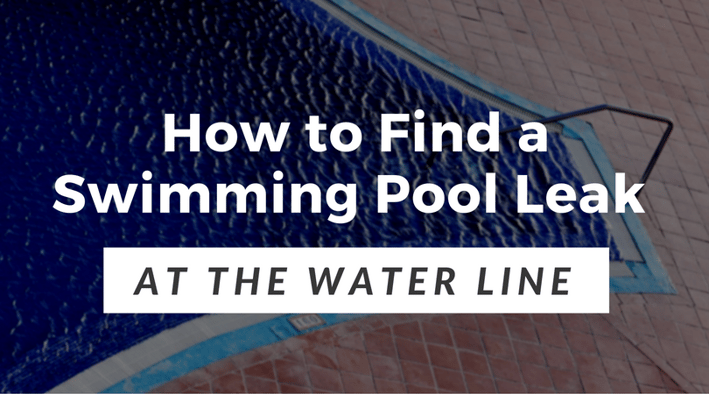
Finding a swimming pool leak at the water line may be easy. Pool leak detection at the water line means checking all fittings in the area including:
Many swimming pools and spa tubs have decorative tile borders at the water line. The tiles are usually two to four-inch squares.This is common with in-ground pools that are concrete or gunite. It is less common in fiberglass pools since they are generally one-piece units.
The tiles are set in grouting and they often act as a water level guide. The water level recommendation may be to the top or bottom of the tiles. If the grouting is cracked, water may seep in behind the tiles causing damage to the pool's surface. Older in-ground pools should be checked frequently for this problem.
A cracked tile may need replacing. Decorative mosaic tiles at the water line should also be checked. Many newer pools have lovely designs set into the surface with smaller mosaic tiles that could come loose.
You probably have a pool ladder that extends from the deck into the pool or spa tub. Or,you may only have a railing that connects to the pool or spa around the water line. Check the connection. A loose connection can allow water to seep into the gunite or cause cracks in fiberglass.
Swimming pool lights just below the surface must also be checked for a tight fitting. Check the area around the lights for surface cracks that could lead to leakage. Also, check any decorative attachments located just below the water line.
There is an area in gunite pools where steps were put in for easy access, at least in the shallow end of the pool. Look for little cracks in the surface just at or below the water line. A little crack can be easily filled to prevent a larger leak.
A pool's skimmer is part of the intake system and it is usually placed at the water line. This applies to fiberglass and vinyl pools as well as gunite. It collects debris and carries it to the filter system. Pool leak detection often starts at the skimmer connection. Make sure the skimmer is tightly secured to the pool. A skimmer that has pulled away from the surface will not work properly and you may have dirty water in addition to a leak.
The intake lines should be working correctly when the pump motor is on. The skimmer and float valve should function to take in small debris from the surface. Pull out larger leaves, twigs and other debris with a pool net.
Contact with hard objects can cause cracks and leaks on the surface of the pool, especially at the water line. A hard object that falls into the pool and hits the side of the pool or spa tub should be removed immediately and that section must be checked for surface cracks.This applies to fiberglass and vinyl pools as well as gunite.
Aquaman Leak Detection will repair any surface cracks that can cause leaks. Our professional staff is experienced at pool leak detection and we may find small fissures that you could not locate. We use a red dye to locate and repair small leaks at the water line and below. It's important that you get your pool repaired quickly and properly.
Aquaman serves Houston, TX and 11 counties in Central Florida coast-to-coast with immediate repair service.

With over 20 years of reputable experience finding leaks, owner Lowell Ball created a unique and patented leak detection system that accurately finds leaks without damaging property. We are so confident in our system and our workmanship, we offer the strongest warranty in the industry.
Aquaman Leak Detection Corporate
1275 South Patrick Dr, Suite A6
Satellite Beach, FL 32937
Owner Direct: 321.431.4784
844.766.5532 (844 POOL LEAK)
info@aquamanleakdetection.com
Office Hours:
9AM-6PM Mon-Fri
Emergency Service Available 24/7
Blog Comments